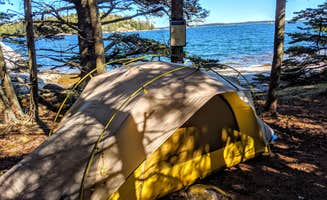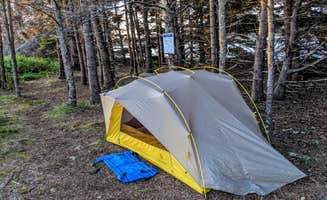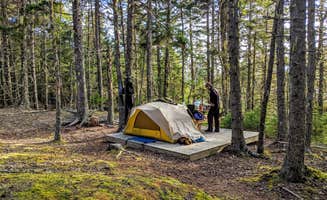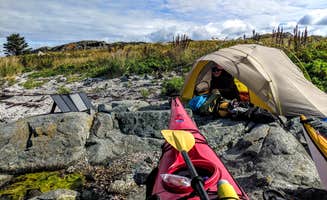Dispersed camping near Bucksport, Maine centers primarily around island-based experiences in the Gulf of Maine. The coastal archipelago presents unique challenges with strong tidal variations ranging from 8-12 feet between high and low tide. Water temperatures remain cold year-round, averaging 50-60°F even during summer months, requiring careful paddling preparation and navigation skills for accessing these remote sites.
What to do
Beach exploration: Marshall Island features Sand Cove, a prime location for shoreline exploration. "Sand Cove is perfect for a beach fire and stargazing on a clear night," notes one visitor to Marshall Island.
Star viewing: The Deer Isle Archipelago offers exceptional dark sky viewing opportunities away from mainland light pollution. According to an experienced camper, Marshall Island provides "some of the best stargazing spots we've ever seen!"
Island hopping: Wheat Island serves as an excellent base for exploring nearby islands. "Perfect island for exploring the close-by Isle au Haut, a remote section of Acadia National Park," reports a camper who stayed at Wheat Island.
What campers like
Solitude: The limited access to these islands ensures relatively low visitor numbers compared to mainland camping areas. "We stayed at one of the 2 sites near Sand Cove which is a truly gorgeous wooded area with a tent platform and a picnic table at each site," shares a Marshall Island visitor.
Protected paddling: Buckle Island offers sheltered approaches suitable for less experienced kayakers. "This is a perfect island for those new to sea kayak camping as the sandy shore, which is exposed for a good portion of the day, is easy to land on and a short walk to a trail into the woods," explains a camper from Buckle Island.
Diverse landing areas: Each island in the archipelago presents different landing challenges and opportunities. Doliver Island features a "gorgeous shell covered beach and a beautiful view of Isle au Haut, just next door," according to visitor reports.
What you should know
Membership requirements: All camping on these islands requires Maine Island Trail Association membership. Sites are "first come, first served and completely free for MITA members," notes a visitor to Doliver Island.
Self-sufficiency: Campers must bring all supplies including water. A regular visitor advises: "If you happen to need a food or water resupply, Swan's Island is a short paddle away and has a very small grocery store and town office with fresh water."
Space limitations: Some islands have extremely limited camping capacity. Doliver Island is described as "small with barely a tent space, but a good stop for us on our 9 day journey and a perfect launching spot for crossing Jericho Bay (4.5 miles) to Marshall Island the next day."
Tips for camping with families
Best beginner islands: For families new to island camping, select sites with easier landings. "This is a perfect island for those new to sea kayak camping as the sandy shore... is easy to land on," notes a visitor referring to Buckle Island.
Wildlife watching opportunities: The islands support diverse bird populations, providing educational opportunities for children. "Gorgeous views of the sun setting and full moon rising" are available from the southwest site on Wheat Island.
Plan for insects: Mosquito activity varies by island and season. One camper reported: "Despite the fact that the other islands had pesky mosquitoes, this site had none," referring to Marshall Island, while noting that on Doliver Island "they were pretty bad all day long" even in early September.
Tips from RVers
Mainland basecamp options: Since these islands require boat access, RVers often establish mainland base camps. The closest options for RVs are in Bucksport or Deer Isle where RVs can be parked while kayaks are launched for island access.
Gear transportation challenges: RVers must carefully plan what equipment to transfer from vehicles to kayaks. "Come prepared with fresh water and wag bags," advises a regular visitor to Buckle Island, highlighting the need for portable waste management systems when camping on these primitive islands.
Weather monitoring: RVers who venture to the islands should maintain communication capabilities for updated forecasts. "This can be a tricky island to land on at high tide, so plan accordingly," notes a camper about Wheat Island, emphasizing the importance of timing water crossings properly.





